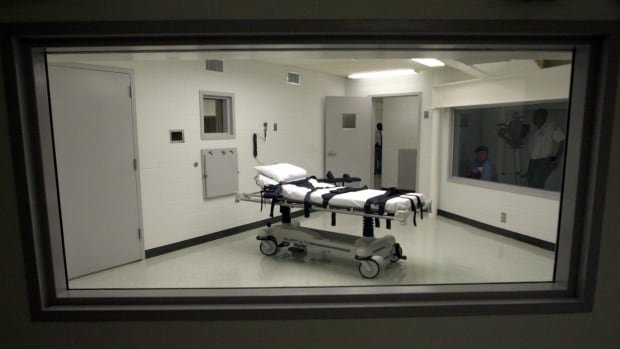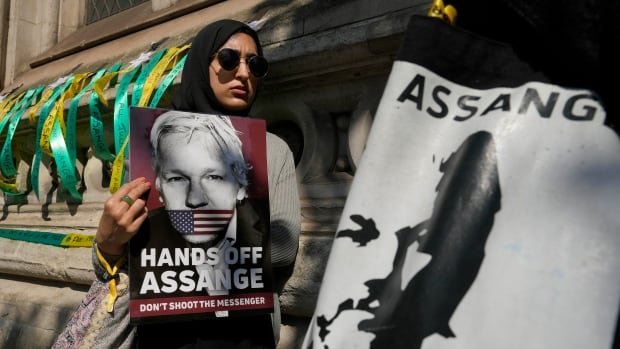Alabama intends to strap Kenneth Smith to a gurney Thursday and use a gas mask to replace breathable air with nitrogen, depriving him of oxygen, in the nation’s first execution attempt using the method.
“What effect the condemned person will feel from the nitrogen gas itself, no one knows,” Dr. Jeffrey Keller, president of the American College of Correctional Physicians, told the Associated Press by email. “This has never been done before. It is an experimental procedure.”
Nitrogen, a colourless, odourless gas, makes up 78 per cent of the air inhaled by humans and is harmless when breathed with proper levels of oxygen. The theory behind nitrogen hypoxia is that changing the composition of the air to 100 per cent nitrogen will cause Smith to lose consciousness.
“Since the condemned person will not be breathing any oxygen, he will die,” Keller said. “It is little different than putting a plastic bag over one’s head.”

The state of Alabama has predicted in federal court filings that the nitrogen gas will “cause unconsciousness within seconds, and cause death within minutes.”
After Smith is strapped to the gurney in the execution chamber, the state said in a court filing that it will place a “NIOSH-approved Type-C full facepiece supplied air respirator” over his face. The nitrogen gas will be administered for at least 15 minutes or “five minutes following a flatline indication on the EKG, whichever is longer,” according to the state.
Unknown territory
The American Veterinary Medical Association wrote in 2020 euthanasia guidelines that nitrogen hypoxia is not an acceptable euthanasia method for most mammals because the anoxic environment “is distressing.”
UN Human Rights Council experts are alarmed by the proposed execution method. They said it could violate the prohibition on torture, which the U.S. is a party to.
Dr. Joel Zivot, an anesthesiologist who is one of four professionals who filed the UN complaint, said Smith is at risk for seizures and choking to death on his own vomit. He said any leak under the mask could prolong the execution.
“A leak will do two things. It will potentially endanger people around. Air could then get under the mask as well,” Zivot said. “And so the execution could be prolonged or maybe he might never die, he just could get injured.”
Alabama, quoting from the recent federal court ruling, said in a statement, “there is simply not enough evidence to find with any degree of certainty or likelihood that execution by nitrogen hypoxia under the Protocol is substantially likely to cause Smith superadded pain.”
Much of what is recorded about death from nitrogen in medical journals comes from industrial accidents, where leaks or accidents have killed people, and from suicide attempts.
Among other arguments made by Smith’s attorneys to prevent the execution is their argument that the plan violates the ban on cruel and unusual punishment and at least merits more scrutiny before it is used.
The U.S. Supreme Court, in a 2019 opinion, ruled that a painless death is not guaranteed by the Constitution.
Death penalty on the wane, but election could be factor
Hydrogen cyanide and carbon monoxide have been used in the past for gas chamber executions. Electrocution, hangings and firing squads have also been employed.
But lethal injection has been the dominant method since the 1980s, used in 89 per cent of all executions since the death penalty was reinstated in 1976.
Some states are exploring new methods as some pharmaceutical companies have balked at their drugs being used for lethal injection, making them harder to obtain. The issue came to the fore following the plagued 2014 Oklahoma execution of Clayton Lockett.
“They’ve tried to fix lethal injection … and they haven’t been able to,” said Deborah Denno, a law professor at Fordham University and an expert in execution methods. “The same thing happened with electrocution. It’s just sort of this continuing theme of pushing to get executions no matter the cost involved, and that did propel this change to nitrogen gas.”
In the U.S., 29 states have either abolished the death penalty or put a pause on executions through executive or gubernatorial action, according to the Death Penalty Information Center. Another 11 have the death penalty on the books but haven’t carried out an execution in at least a decade, the Washington, D.C., non-profit organization says.
In 2023, just five states executed people. A total of 24 inmates were executed, the ninth consecutive year of fewer than 30, and a steep drop from 1999, when a modern-day high of 98 prisoners were executed in the U.S.
Americans head to the polls in November for what’s expected to be one of the most consequential presidential elections in U.S. history. CBC’s Paul Hunter breaks down four things to watch for as the high-stakes campaign unfolds over the next 10 months.
Executions of federal death row inmates were paused between 2003 and mid-2020. Donald Trump’s administration re-authorized them, with the short-acting barbiturate pentobarbital employed to replace a previous three-drug regimen.
Thirteen federal executions were carried out, with the last on Jan. 16, 2021.
Trump, who is on the campaign trail for president again, has spoken enthusiastically at rallies for expanding the use of the death penalty.
The U.S. is an outlier among Western and advanced nations on the issue, with the vast majority of executions carried out by authoritarian regimes in China, Iran and Saudi Arabia.
Protests planned in Alabama
Smith’s spiritual adviser said the inmate is afraid of what is about to happen to him.
“Presently, Kenny is sickened, deeply pained and horrified at the nitrogen hypoxia experiment that is to come,” the Rev. Jeff Hood, a death penalty opponent, said.

Smith, 58, was one of two men convicted of the 1988 murder-for-hire of a preacher’s wife. Prosecutors said the men were paid $1,000 US to kill Elizabeth Sennett, 45, on behalf of her husband, who wanted to collect on insurance.
Sennett’s husband killed himself when he became a suspect. John Forrest Parker, the other man convicted, was executed in 2010.
Smith is one of few people to have experienced a prior execution attempt. The state attempted a lethal injection in 2022, but the prison system called it off before the drugs were administered because the staff had difficulty connecting the two required intravenous lines.
Several protests are planned in the state if appeals don’t delay Thursday’s execution.











